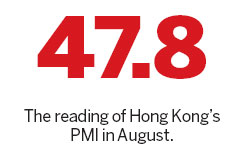City's private sector in worst shape in two years
Updated: 2011-09-06 07:53
By Li Tao(HK Edition)
|
|||||||

PMI falls below 50 for the frist time since June 2009
Operating conditions in Hong Kong's private sector economy deteriorated for the first time in 26 months in August, as demand contracted markedly amid a worsening economic environment, the latest reading of the HSBC Purchasing Manager's Index (PMI) released Monday indicated.
A reading above 50 indicates expansion, while that below 50 signals contraction. The headline index dropped to 47.8 in August compared with a rebound of 51.4 a month ago. It is also the first time that the index has fallen below 50 since June 2009.
New orders - a sub-index that tracks overall new business the city received - dropped to 48.1 in August from the previous 52.6 due to weaker external demand, the report shows.
Despite the new business from the mainland sub-index slipping to 52.6 from 54.2 in July, the moderate expansion nevertheless indicates steady demand from the mainland as around 23 percent of respondents reported higher orders from the city in August compared with the 19.2 percent who recorded a fall.
Although the mainland demand for Hong Kong goods and services is still holding firm, HSBC Hong Kong Chief Executive Mark McCombe said weakening demand in the West is adversely weighing on business conditions and hiring activities.
The lower levels of new business has "dragged back output activity", which in turn fell to 46.3 in August from 51.4 a month earlier, Donna Kwok, Greater China economist from the bank, said in an email report.
The contraction in new orders and output also discouraged hiring in Hong Kong's private sector. The employment sub-index slid below 50 to 47.3 in August from 51.7 in the previous month - the first time since December 2010, indicating that staff numbers in the city fell last month.
However, the report indicated that the weaker employment index was partly attributed to slowing demand and was also due to an increase in voluntary resignations.
Kwok said that given the improvement in July's unemployment reading, which stood at 3.4 percent seasonally adjusted, it's unlikely that the impact of weaker economic activity is affecting the job market yet.
"Moreover, the impact of lower business demand on hiring activity may take longer than usual to feed through this time, as the economy has been running at over-stretched capacity for quite a number of months; a situation that will take time to unwind," said Kwok.
The August HSBC PMI suggests that mainland demand is still providing a critical lifeline to Hong Kong, but the city is not immune from the impact of slowing Western demand, Kwok wrote.
The HSBC PMI is based on five sub-indices, including output, new orders, employment, suppliers' delivery times and stocks of goods purchased.
"With inflationary pressures still stubbornly high and private business sentiment starting to cool in Hong Kong, private consumption could potentially follow suit soon," said McCombe.
The Hong Kong economy slowed in the second quarter as export growth decelerated, but despite the increasing level of uncertainty in the global environment, concern about an imminent recession in Hong Kong might be overblown as domestic demand remains strong, Joanne Yim, chief economist of Hang Seng Bank, wrote in a report published Monday.
Yim believes that slowing economic growth could also be a blessing in disguise as it would help ease escalating inflation pressure and easing demand, according to Yim. It would at least help alleviate domestically-generated price pressures, though imported inflation would keep consumer prices at relatively high levels.
litao@chinadailyhk.com
China Daily
(HK Edition 09/06/2011 page2)